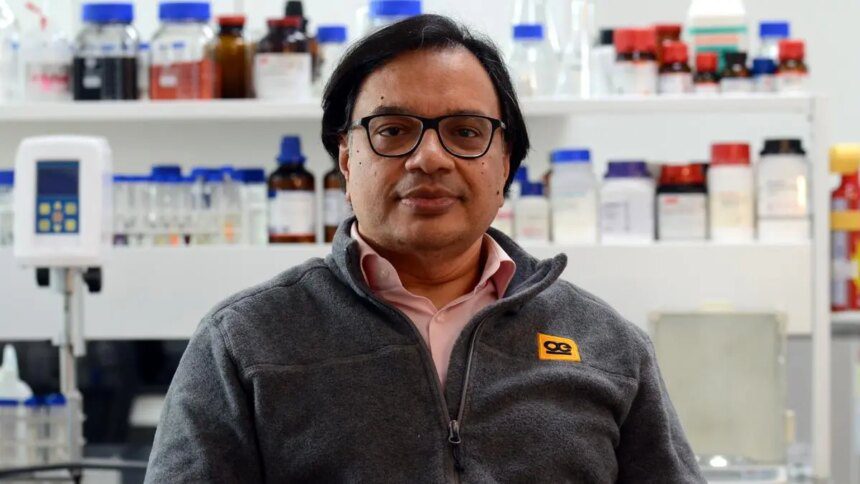When discussing batteries, many envision electric vehicles in motion. However, Rishi Srivastava, Co-founder of Offgrid Energy Labs, argues that the most significant potential lies in stationary storage solutions. He advocates for zinc as an alternative to lithium, which can enhance energy supply for factories after dark and electrify off-grid villages.
Founded in 2018 at IIT Kanpur, Offgrid Energy Labs is an innovation-driven battery technology company specializing in ZincGel technology. This approach is grounded in three key areas: alternative chemistry, materials and design, and manufacturing. Utilizing widely available, non-toxic components and zinc-bromide chemistry, Offgrid has developed more than 25 intellectual property families and over 50 distinct IP assets, with a proprietary electrolyte at the technology’s core.
“Zinc bromide chemistry has existed for a long time, but we have enhanced it to address long-duration energy storage solutions that last six to twelve hours for industrial use. Additionally, we focus on materials selection. The geopolitics surrounding energy storage significantly affects lithium availability, controlled largely by one country utilizing rare earth materials. We aimed to construct our battery with components accessible worldwide,” Srivastava noted.
India ranks as the third-largest solar power generator and fourth in wind energy globally. Offgrid’s batteries harness energy during sunny or windy periods and release it when demand peaks.
The scope of Offgrid’s batteries extends beyond renewable energy integration, catering to industrial net-zero initiatives as well. Many facilities, shopping centers, and offices still depend on diesel generators for backup, despite having substantial renewable energy production. Offgrid’s technology effectively captures and reallocates this otherwise wasted energy.
Furthermore, Offgrid’s ZincGel presents advantages over lithium in applications like mobile phones, where lithium batteries degrade over use. In contrast, Offgrid batteries maintain stability throughout their charge-discharge cycles, boasting a life expectancy rated for 7,500 cycles.
“We are confident our solution will achieve superior efficiency compared to lithium regarding levelized cost of storage. Our key objective is to become the most affordable energy storage provider,” Srivastava emphasized.
Recycling lithium batteries poses challenges due to their volatility; however, Offgrid’s technology is fire-resistant and built from sustainable, readily available materials like zinc bromide and carbon. This focus on stability and scalability contributes to the commercial viability of Offgrid’s offerings. As Srivastava remarked, “Customers prioritize reliable and cost-effective backup solutions, particularly in industrial settings.”
Despite the continuing dominance of lithium batteries in mobile applications and consumer electronics due to their compact energy density, Offgrid concentrates on stationary storage aimed at renewable energy and industrial facilities—markets that may expand faster than the mobility sector.
The battery market is rapidly growing, and Offgrid sees considerable opportunities. Although the company does not target electric vehicles due to energy density constraints, its strength lies in industrial stationary applications, which could surpass mobility in growth.
Offgrid is establishing a 10 MWh manufacturing facility in the UK, planned as a precursor to a larger gigawatt factory in India. Srivastava noted that “Battery manufacturing demands high precision, and Europe shows substantial demand for sustainable batteries. Once we finalize our product, we aim to set up our initial gigawatt unit in India.”
Currently pre-revenue, Offgrid anticipates its first sales within 24 months and aims to break even three years after launching its gigafactory. Industrial pilots are already in progress, including a collaboration with Shell in India.
“Industrial batteries are marketed in terms of megawatts. A production of 10 megawatt hours annually qualifies as a commercial-grade product. We’ve initiated a pilot project with Shell to energize a gas station, converting 100 kilowatt hours into 10 megawatts. Once our UK plant is operational, we expect to deliver batteries within the next 12 months. We will proceed with the gigawatt plant only after our pilot projects prove successful,” he explained.
Beyond India, Offgrid is pursuing global market opportunities, with the U.S. identified as a key target due to states like California mandating sustainable energy storage solutions.
Partnerships are integral to Offgrid’s go-to-market strategy, covering four critical areas: supply chain, applications, manufacturing, and subsystems. Archean Chemicals, a major bromine producer, led Offgrid’s recent Series A funding round and serves as a vital raw material collaborator.
In September, Offgrid successfully raised $15 million in Series A funding, spearheaded by Archean Chemicals Industries with participation from Ankur Capital and Shell Ventures.










